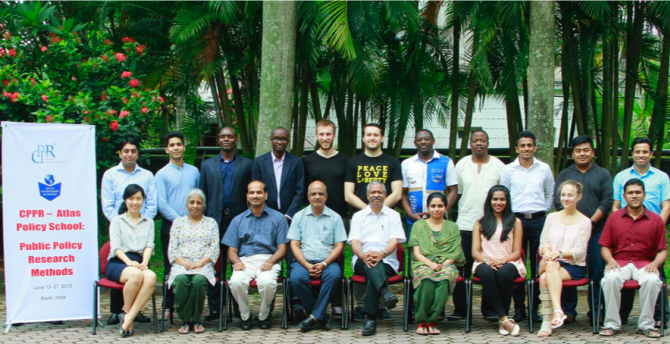
Making an impact in public policy requires learning rigorous research methods and best practices in publishing policy papers. At the recent CPPR-Atlas Policy School 2015, participants spent 14 days of intensive training in which they were challenged to develop their research agenda, conduct field research, draft policy papers, and present their findings in groups.
Held in Kochi, India, a major port city on the southwest coast of India, the training event brought together 12 leaders from think tanks representing more than 10 countries across Asia and Africa. The advance training in public policy and research methods was facilitated by Atlas Network partner Centre for Public Policy Research (CPPR), in partnership with Atlas Leadership Academy.
Graduates of this year’s training also participated in sessions on topics essential to conducting and releasing quality public policy research, including public management, legal research, and the evaluation of policy frameworks and impact. Participants left the training with research plans and immediate next steps to advance policy reforms in their own countries.

Policy school participants share their learning objectives on the blackboard.
“I want to gain research and management skills necessary to strengthen our organization and grow policy impact in my country,” said Dhananath Fernando, from newly founded Atlas Network partner Foundation for Economic Freedom in Sri Lanka.

Dr. Gita Gopal, S.J.D., from Harvard Law School has been advisor to international and government institutions for 20 years. Here, she teaches participants methodological techniques in how to evaluate policy impact.

Participants listen attentively to CPPR-Atlas Policy School lecturers. From left to right: Admir Čavalić, from Multi (Udruzenje Gradana) in Bosnia; Agurag Pant, from Samriddhi, The Prosperity Foundation in Nepal; and Alex Njeru, from the Eastern Africa Policy Centre in Kenya.
“I was amazed by the repertoire of speakers that CPPR was to put together,” Njeru said. “The speakers had broad-ranging experience in either academia or professional practice, which made the program robust and well-rounded.”

Participants design research agendas and methodologies in group workshops. From left to right: Chiyembekezo Emmanuel Lyson, from Center for Free Market Enterprise in Malawi; Rofi Uddarojat, from Center for Indonesian Policy Studies; Raju Sharma from Awaaz Nepal; and Rishi Kochhar from Amritsar Policy Group in India.

Participants discuss the design of field work questionnaires with an experienced field researcher. From left to right: Medeni Sungur, from Freedom Research Association in Turkey; Egle Uzmiskyte, from Lithuania Free Market Institute; Anurag Pant from Samriddhi, The Prosperity Foundation in Nepal; and Vinny Davis, from Center for Public Policy Research (CPPR) in India.
“Experts I met and friendship I gained during the program were gold,” Sungur said. “I not only had a chance to learn about the public policy–making process from A to Z, but also work with very qualified experts on an exciting research project. My training experience will definitely help us in developing a solid free-market institute in Turkey.”

Training participants head to the fishermen’s village for interviews and surveys. From left to right: Chofor Che Christian-Aimé, from Central African Centre for Libertarian Thought and Action Cameroon; Admir Čavalić, from Multi (Udruzenje Gradana) in Bosnia; Dhananath Fernando, from Foundation for Economic Freedom in Sri Lanka; and Alex Njeru, from East Africa Policy Centre in Kenya.

Anurag Pant from Nepal and Kasmil Gago from the Eastern Africa Policy Centre in Kenya conduct field research on household consumption at a fishermen’s village. Pant is a researcher on “market exit policy” and bottlenecks for entrepreneurs in Nepal, an ongoing project with Samriddhi, The Prosperity Foundation.
Read “CPPR-ALA Policy School graduates show success one year after training.”
Learn more about Atlas Leadership Academy.